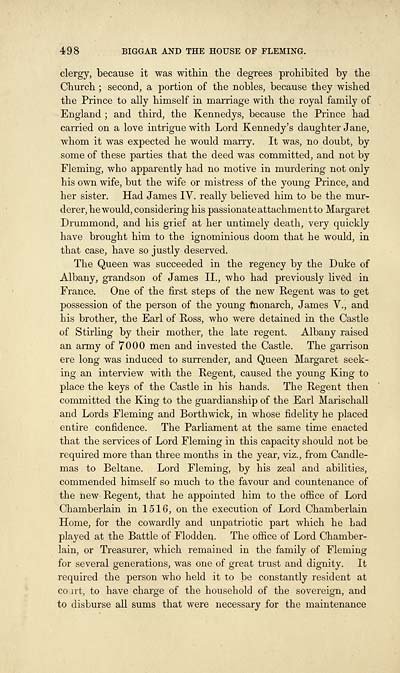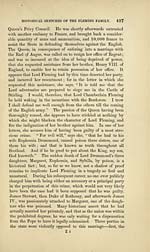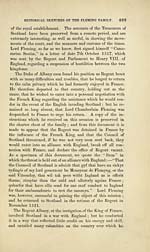Biggar and the House of Fleming
(528) Page 510
Download files
Complete book:
Individual page:
Thumbnail gallery: Grid view | List view

498 BIGGAK AND THE HOUSE OF FLEMING.
clergy, because it was within the degrees prohibited by the
Church ; second, a portion of the nobles, because they wished
the Prince to ally himself in marriage with the royal family of
England ; and third, the Kennedys, because the Prince had
carried on a love intrigue with Lord Kennedy's daughter Jane,
whom it was expected he would marry. It was, no doubt, by
some of these parties that the deed was committed, and not by
Fleming, who apparently had no motive in murdering not only
his own wife, but the wife or mistress of the young Prince, and
her sister. Had James IV. really believed him to be the mur-
derer, he would, considering his passionate attachment to Margaret
Drummond, and his grief at her untimely death, very quickly
have brought him to the ignominious doom that he would, in
that case, have so justly deserved.
The Queen was succeeded in the regency by the Duke of
Albany, grandson of James II., who had previously lived in
France. One of the first steps of the new Regent was to get
possession of the person of the young monarch, James V., and
his brother, the Earl of Ross, who were detained in the Castle
of Stirling by their mother, the late regent. Albany raised
an army of 7000 men and invested the Castle. The garrison
ere long was induced to surrender, and Queen Margaret seek-
ing an interview with the Regent, caused the young King to
place the keys of the Castle in his hands. The Regent then
committed the King to the guardianship of the Earl Marischall
and Lords Fleming and Borthwick, in whose fidelity he placed
entire confidence. The Parliament at the same time enacted
that the services of Lord Fleming in this capacity should not be
required more than three months in the year, viz., from Candle-
mas to Beltane. Lord Fleming, by his zeal and abilities,
commended himself so much to the favour and countenance of
the new Regent, that he appointed him to the office of Lord
Chamberlain in 1516, on the execution of Lord Chamberlain
Home, for the cowardly and unpatriotic part which he had
played at the Battle of Flodden. The office of Lord Chamber-
lain, or Treasurer, which remained in the family of Fleming
for several generations, was one of great trust and dignity. It
required the person who held it to be constantly resident at
court, to have charge of the household of the sovereign, and
to disburse all sums that were necessary for the maintenance
clergy, because it was within the degrees prohibited by the
Church ; second, a portion of the nobles, because they wished
the Prince to ally himself in marriage with the royal family of
England ; and third, the Kennedys, because the Prince had
carried on a love intrigue with Lord Kennedy's daughter Jane,
whom it was expected he would marry. It was, no doubt, by
some of these parties that the deed was committed, and not by
Fleming, who apparently had no motive in murdering not only
his own wife, but the wife or mistress of the young Prince, and
her sister. Had James IV. really believed him to be the mur-
derer, he would, considering his passionate attachment to Margaret
Drummond, and his grief at her untimely death, very quickly
have brought him to the ignominious doom that he would, in
that case, have so justly deserved.
The Queen was succeeded in the regency by the Duke of
Albany, grandson of James II., who had previously lived in
France. One of the first steps of the new Regent was to get
possession of the person of the young monarch, James V., and
his brother, the Earl of Ross, who were detained in the Castle
of Stirling by their mother, the late regent. Albany raised
an army of 7000 men and invested the Castle. The garrison
ere long was induced to surrender, and Queen Margaret seek-
ing an interview with the Regent, caused the young King to
place the keys of the Castle in his hands. The Regent then
committed the King to the guardianship of the Earl Marischall
and Lords Fleming and Borthwick, in whose fidelity he placed
entire confidence. The Parliament at the same time enacted
that the services of Lord Fleming in this capacity should not be
required more than three months in the year, viz., from Candle-
mas to Beltane. Lord Fleming, by his zeal and abilities,
commended himself so much to the favour and countenance of
the new Regent, that he appointed him to the office of Lord
Chamberlain in 1516, on the execution of Lord Chamberlain
Home, for the cowardly and unpatriotic part which he had
played at the Battle of Flodden. The office of Lord Chamber-
lain, or Treasurer, which remained in the family of Fleming
for several generations, was one of great trust and dignity. It
required the person who held it to be constantly resident at
court, to have charge of the household of the sovereign, and
to disburse all sums that were necessary for the maintenance
Set display mode to:
![]() Universal Viewer |
Universal Viewer | ![]() Mirador |
Large image | Transcription
Mirador |
Large image | Transcription
Images and transcriptions on this page, including medium image downloads, may be used under the Creative Commons Attribution 4.0 International Licence unless otherwise stated. ![]()
| Histories of Scottish families > Biggar and the House of Fleming > (528) Page 510 |
|---|
| Permanent URL | https://digital.nls.uk/94845618 |
|---|
| Description | A selection of almost 400 printed items relating to the history of Scottish families, mostly dating from the 19th and early 20th centuries. Includes memoirs, genealogies and clan histories, with a few produced by emigrant families. The earliest family history goes back to AD 916. |
|---|

